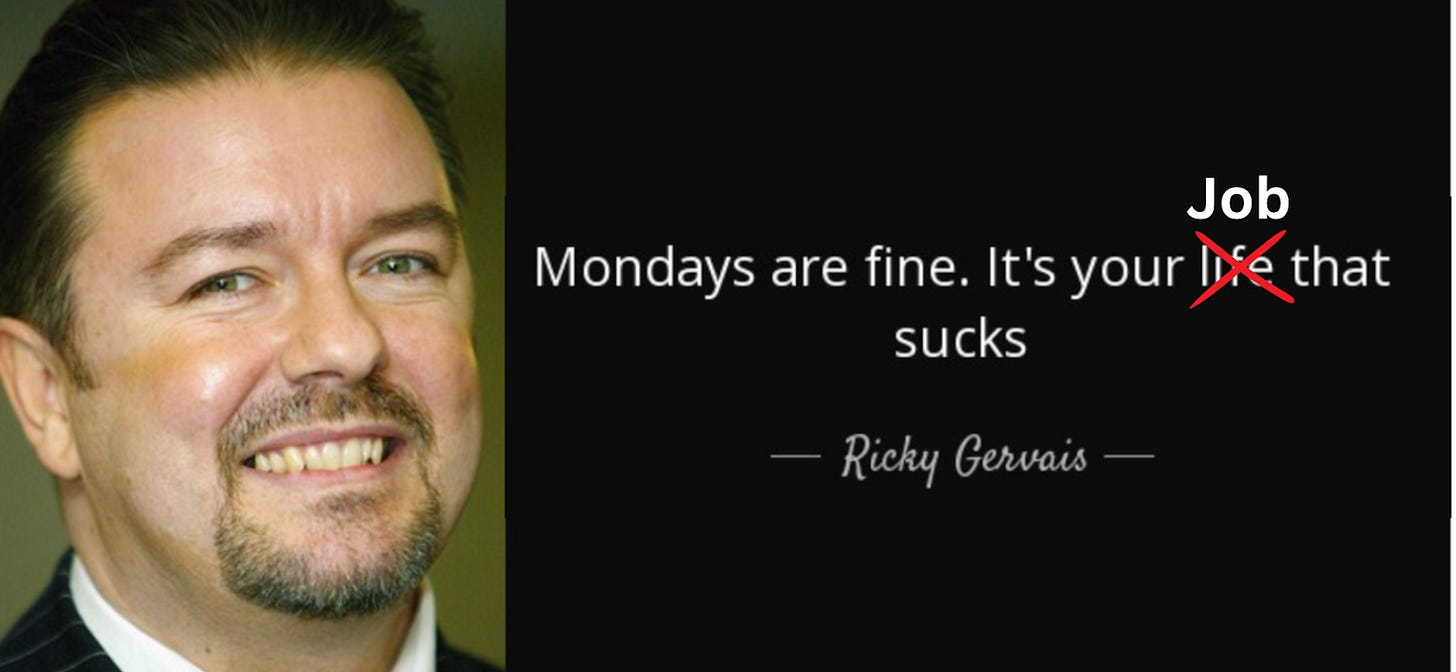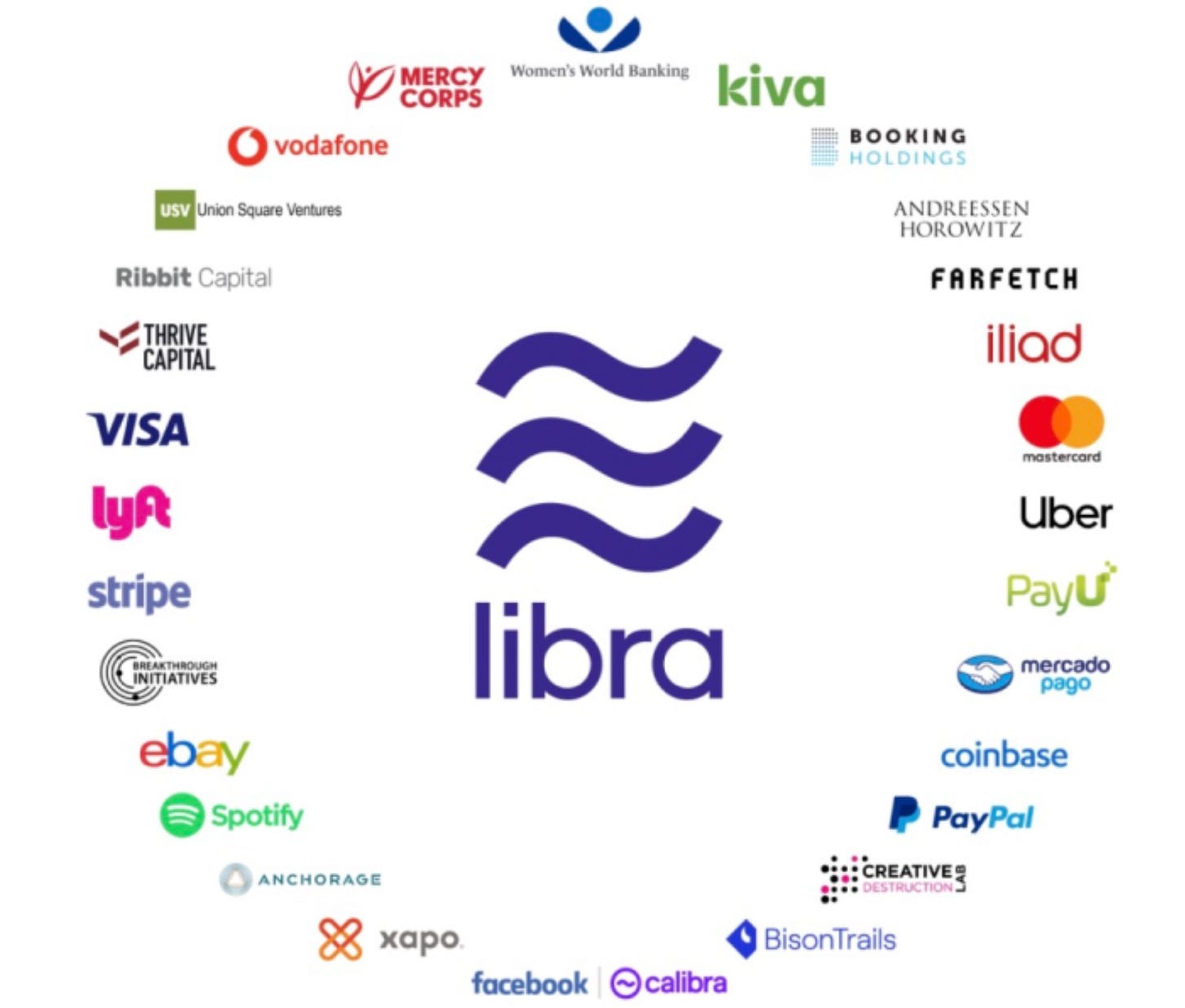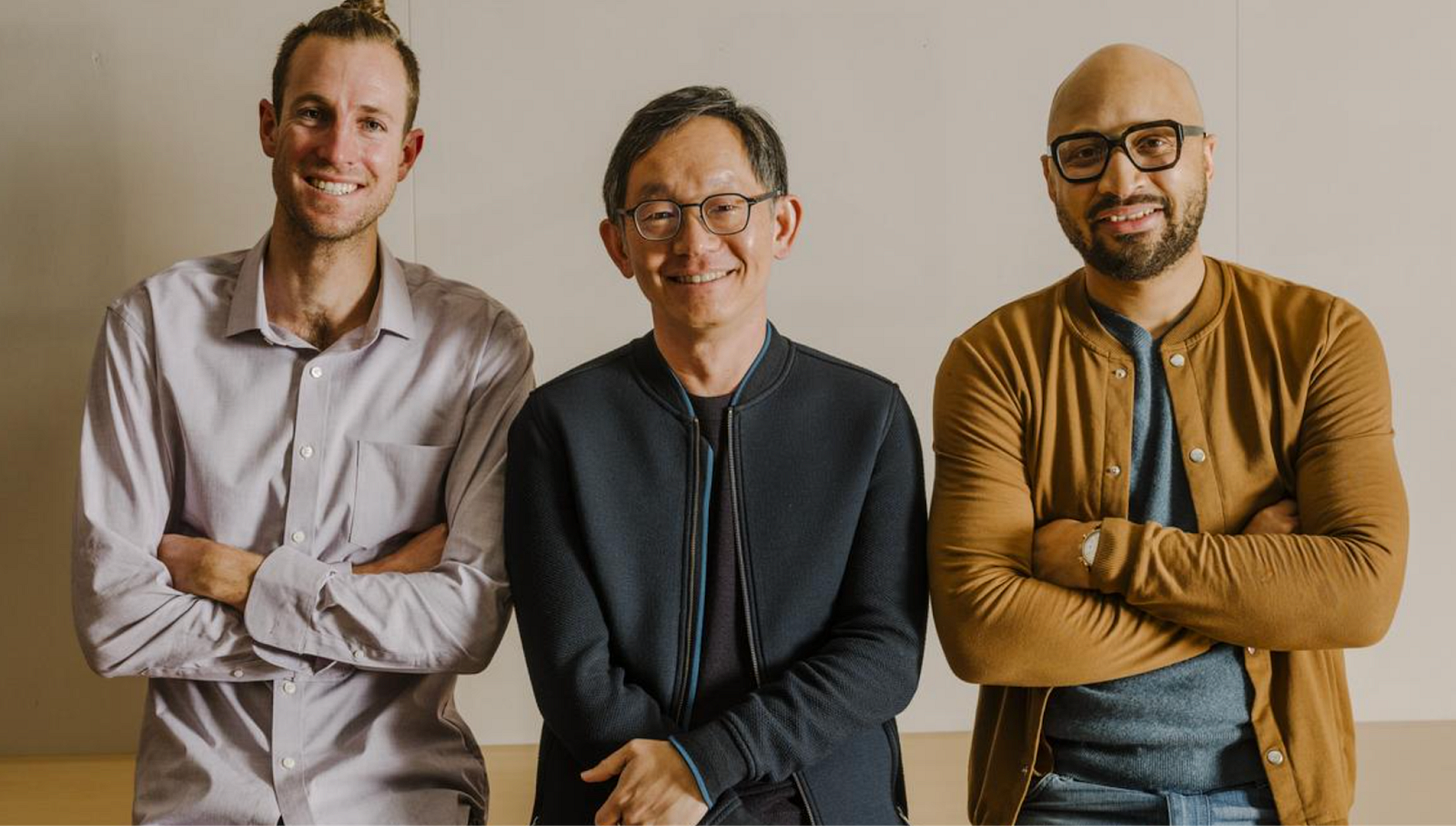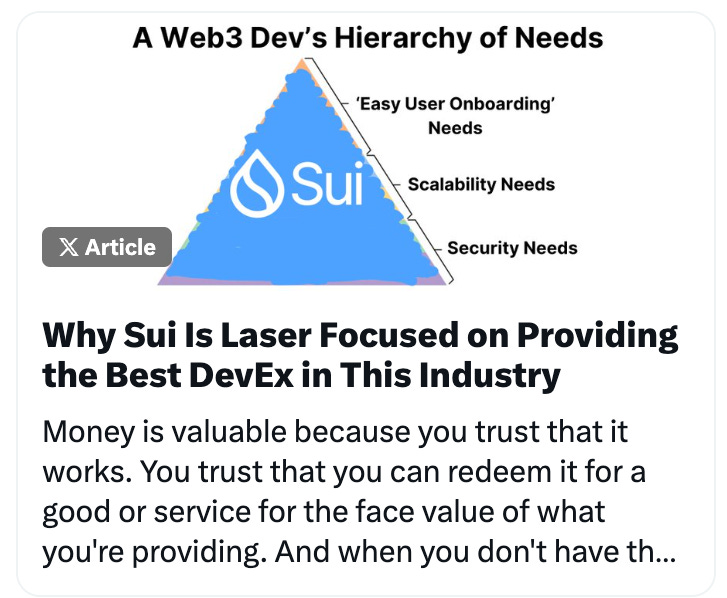Picture this: Your wife is in labor, your first child is moments away from being born, and you’re draining your entire bank account to put everything you had on the line for a risky venture.
Would you do that?
I did it, and that decision changed everything.
That was the turning point in my life that would eventually bring me together with some of the brightest minds in this industry to start Mysten Labs and build Sui.
So let me tell you my story before I tell you the story of Sui.
BTW: Here’s the link to my Substack to stay posted:
The Magic Internet Money That Almost Destroyed My Marriage
This was 2012. I was working in finance.
My days and my work were very predictable. I mean, I could tell you exactly what is going to happen from the time I wake up to the time I leave the office.
I can literally tell you what I was going to do, what train I was going to take, who I was going to see at the door, who was going to be sat down before I sat down, what I was going to write, how I'm going to do my tests, how I'm going to check in the code, what the trader is going to say about the new improvement I've made before I go home.
It was so predictable.
If I should tell you how my mind works, certainty doesn’t really work for me. If you know exactly what's going to happen, it feels boring, right?
So I wanted something uncertain, something that was a bit challenging, or at least gave me the sense that I could be more expansive.
That was also the time when I found out about Bitcoin.
I first read the whitepaper from one of my colleagues, and I thought the thing was a bit of a scam. I was like, this doesn't make much sense, till I looked at the code and then I read the paper again.
I'm like, man, this is incredible, it was great. Now, it just made a lot of sense to me.
The idea of decentralized money hit me. This wasn’t just about mining, it was about the bigger picture. Bitcoin showed me that sound money could exist outside traditional systems.
And I started buying Bitcoin and mining for myself.
I started building my own mining farms in my house. And over time I started doing it for others because I realized that there was a gap in the market. So people started paying me for it.
Till my wife told me to get the machines out of the house because there's no spare room anymore. It's just these machines running over and over again mining Bitcoin. So I started renting data center space and built my mining company as a result. It was just accidental.
But then came the moment when I went all in.
Imagine being in a hospital, with your wife in labor, and you have to confess that you've just spent all your savings on Bitcoin mining machines. This was my reality, and it was a moment that could have gone either way.
I was nervous and anxious, but also hopeful. I knew it was a risk, but I believed in the potential of crypto to change our lives.
My wife was understandably upset, but I reassured her that this was an investment in our future.
I knew the value of taking calculated risks and pursuing my passions, even when it meant facing uncertainty and potential failure.
So, I bought machines with all that money, I put them in data centers, and people would pay me to rent the time on my machines, and they got to keep the Bitcoin. I'd take a fee.
Most of my orders were coming from America, and in fact, my biggest supplier was in Texas. So, with the amount of money I was spending on my suppliers and earning from the U.S., it made sense to park myself there to grow the business.
So, I jumped on a plane and went to America.
It was meant to be a temporary six-month move to try and work with a supplier while the machines got to production, but it ended up becoming something much more permanent.
This was not the first time I had to suddenly move to a new place and get adjusted to new environment and people.
The Nigerian Kid With an Aberdonian Accent
Let’s go back to how all of this started.
I was born in Nigeria, left when I was eight years old. My dad was a PhD student who was working on his economics PhD. So my family moved to Aberdeen in North Park, East of Scotland where he pursued his PhD in economics (down the road, my brother will also follow the same path).
Because of that I eventually developed a very strong Aberdonian accent - which is weird, you know, you've got this kid from Nigeria speaking like a Scot. It's very weird.
Then when my dad finished his PhD, we moved again, this time to England. He started working, but then made a bold move - he quit his job and became a full-time preacher, dedicating himself to serving the Lord. This showed me: everything is possible, you are not restricted to one thing you once decided upon.
And my mom, well, she's an entrepreneur through and through. She was always investing in business and real estate. Let me tell you, she's probably the best negotiator I've ever met. You go to the marketplace and she'll be negotiating embarrassingly to the point where they'll give her what she wants. She doesn't take no for an answer.... I probably got some of that from her, but not to the level of what she has.
It wasn't always a smooth road - moving countries, adapting to new environments, watching my parents take leaps of faith. But looking back, I wouldn't change a thing. My parents were an incredible inspiration through it all.
Life Sucks When It's Predictable
After that childhood, I moved around and studied at Queen Mary University.
But honestly, I had no interest in education whatsoever. I just wanted to play video games and have fun.
It was only when I was doing my final exams that I realized, man, I really should take this school thing seriously.
Then I looked at a few of the people I used to hang out with and realized they weren’t going anywhere. Two of them ended up in jail, and others got into all kinds of shady stuff like drug dealing.
I thought, there's no way I want that life for myself. I have African parents. That would be the end of me 😬.
So that year, I was like, oh, I need to fix this. I need to be serious.
I worked hard and I got into Queen Mary University by the skin of my teeth.
After joining, I did a one-year introduction program to decide what I was going to do. I indexed on astrophysics because I was always interested in space. Then it got me thinking, I need to do something tangible. Astrophysics for me is very theoretical.
Theory is great, but I think my brain really loves things that are tangible that I can touch.
So I jumped out of astrophysics and went into electronic engineering with computing. And you know, that's where my love for computers, my love for programming, my love for building software really, really grew.
From there, after graduating, I actually went and started building software and hardware to monitor oil and gas production remotely at a startup.
Then I jumped into finance, and started building trading systems, trading algos, and risk management systems as well. I was at JP Morgan and HSBC, building such systems. It was a lot of fun, but at some point, it started to get boring.
As I said before, it was very predictable. I could tell you from the time I woke up to the time I'm going to leave, like I can literally tell you what I was going to do.
Along with that, I couldn't also see where my long-term value is going to be, where I can make a significant impact.
I don't want 1% improvements, It needs to be 100x. It needs to be something that I could talk about and feel really proud of over and over again.
So moving to America because of my Bitcoin mining company was a blessing in that sense because now I knew that this technology that Bitcoin pioneered could be a lot bigger than just sending P2P cash. It could change how our world operates.
I started to see the bigger picture.
Finding Clarity Through Burnout
After spending some time in the Bitcoin mining space, I got a bit disillusioned because I felt like we weren't making much progress in the Bitcoin space.
Bitcoin mining is one thing, but what are we going to do beyond just the mining? What else is possible?
And because of my background in the enterprise world, and building for large major banks, I felt, okay, maybe blockchain technology is the solution to a lot of the problems we wanted to solve in the enterprise world. So let's take blockchain technology to the enterprises.
That's how I started working at Oracle, and then VMware.
VMware is a software company that specializes in cloud computing technologies. Going to VMware was a new challenge for me. They were building this enterprise blockchain-based solution, and the development of that product was behind compared to the competitors.
I mean, they were just starting out. They had almost nothing beyond just the algorithms.
So we have to now build out this new product offering, go to market with this, sell it to enterprise, sell it to customers and try and catch up with everybody else who'd been around for a lot longer than we were, like IBM and Oracle.
We had a lot of catching up to do.
I felt that pressure. I know from my history of being in crypto that things move really, really fast. I felt the pressure of having to get something out quickly because I know what it's like to lose, and it's not good.
If you don't go into it with a hundred percent, and if you fail, then you know you've failed for not trying.
And to make everything worse, I've always just been a competitive idiot. Whether I'm on a field playing football, playing basketball, or playing video games, I've always wanted to win. And for me, it's a win when it's a big win. I mean, I don't want to beat you 1-0 in FIFA. I have to beat you 6-0.
There has to be a big gap. For me, that's a win.
So I took on more responsibility in a very short space of time, just because there was so much work to do. I found myself working on marketing, engineering, product, you name it. I was doing so much travel, and conferences, it was a lot for one person.
But I was very driven.
I always told myself and my team, "We have to be the best. We're still behind. We've got to get this out as fast as possible."
I'd be working 20-hour days, seven days a week. I'd be working in the car on the way to the office, I'd be working on my drive back home, then get back on the computer working again. I was working with people in different time zones.
I was always working. I thought I was unstoppable.
But I very quickly started to realize the real problems. And it's not the tech. The technology is there, we can build it. But it becomes an issue around ownership.
See, all these companies, they all want to own a piece of the infrastructure that they need to control. When you have that mindset, you end up not being able to build a proper consortium because there's no alignment. Every company involved is trying to grab a piece of the pie, and nobody's willing to work together toward a common goal.
And then, for the first time in my career, I literally experienced burnout. It hit me like a truck. I burnt myself out in six months. Literally six months.
That experience taught me that you can't equate failure to something that would happen within a six month, seven month window. You need to see it as a longer-term focus. And that's something we've taken to heart with Sui. We're not just looking for quick wins - we're building for the long term, trying to create a truly decentralized internet.
It's not about 1% improvement. It needs to be 100x.
It needs to be something that I could talk about and feel really proud of over and over again.
But that also requires a 100x team, and that’s what happened next.
And it all began with Facebook's Libra project.
Meeting The 100x Team
So after that burnout experience at VMware, I ended up at Facebook.
At Facebook, I started working on this project called Libra. It was a very, very ambitious project where Facebook put together a consortium that built a blockchain to create a global digital currency and payments system.
What drew me to Facebook is there was exactly this consortium that we were not able to build at my previous jobs: Here, at Facebook they have been able to align themselves around goals of what they want to achieve.
So the ‘Bootstrapping Problem’ that I saw at Oracle and VMware were there, but I felt that Facebook had actually solved it with a consortium of Libra and Diem. And they were dedicated to building this infrastructure for the whole world.
The idea was to make sending money around the internet as easy as sending an email. We thought it was a public good, something that could really benefit the world.
And let me tell you, after what I went through, Facebook felt like a piece of cake. It was a completely different environment.
Facebook was able to build one of the best research teams I've ever seen.
We had professors from Stanford, prominent computer scientists, brilliant minds from all over the world.
I had a great experience working with David Marcus, a great experience working with Kevin Weil, and a great experience working with everybody there. They built a really good team culture. Everybody was really gung-ho on the mission we were trying to achieve.
But even with all that talent, we faced huge challenges.
The biggest issue was that because of Facebook's past problems with public trust and data privacy, people were skeptical about them starting a new financial system.
I mean, think about it - if you wake up tomorrow morning and 2 billion people have a bank account with the “Bank of Facebook”, it's the biggest bank ever.
That's scary for any nation-state.
Along with that the public opinion was 'I don't trust Facebook. It's a monopoly.' And that was the problem we were trying to solve.
How do you build trust when you're starting from a place of distrust?
Because of all that, in the end, Libra didn't work out.
In hindsight, I think we probably underestimated Congress's aggression towards Facebook. But, I actually think Zuck should be championed, and so should David Marcus for having the balls to actually try and do what no one else tried.
And if you think about it, Facebook, in failing to launch, actually blew the door wide open for everybody else, like PayPal, Visa, Circle, and many more.
So the investment they made in Libra and the subsequent abolishment of the project opened up the gates for everybody else. And I think they should be applauded for the work they did and for taking such a risk to make it happen.
For me, to see that brilliant team fail because of outside factors was heartbreaking. It was the best team I had ever worked with.
And I had no clue what to do next.
A Brilliant Team Without a Plan
I would also say, for me personally, the failure of Libra also carried a seed of success.
Without that failure, I would never have had the opportunity to collaborate with those brilliant minds who eventually came together to create Mysten Labs and later, Sui.
Looking back at my time at Facebook, one thing that really stood out to me was how impressed I was by Evan and his team.
Evan is a phenomenal leader and a great visionary.
Evan was one of the key innovators behind LLVM, the technology that powers most iPhones and countless other devices we use every day. It's a huge game changer in the tech world, and his work earned him the prestigious ACM Computer Science Award, the same award that some of the top computer scientists in the world have received.
He led the R&D team at Facebook.
They were like mad scientists, coming up with the stuff we use every day. So, when the chance came to work closely with Evan and his team, I jumped on it. That experience is where my friendship with the future co-founders of Mysten Labs began.
Seeing no end in sight to Libra/Diem launch delays, Evan and I got together. He said, "If we were to start a company, who would you want to work with?" He asked the same question to the rest of the founding tem. When we all answered, we came up with the same names so it was simply meant to bes.
Sam Blackshear, was one of the top engineers at Facebook. Move programming language was his brainchild. The guy's a genius.´
Then there's George Danezis, the consensus expert.
Facebook actually went out and acquired his company, Chainspace, to help build Libra. That's how good he is.
And finally, Kostas ‘Kryptos’ Chalkias. The stuff this guy comes up with, it's mind-blowing.
At Facebook, he was the go-to guy for all things crypto, and many of the cryptographic algorithms used in WhatsApp, one of the most widely used apps in the world, were developed by him.
We all got on a call, and it was clear. We all mentioned the same names.
So we said, "Let’s do this!"
There wasn’t any arguing over roles or responsibilities.
Honestly, we didn’t even know exactly what we were going to build yet, but we knew one thing for sure: we wanted to work together. That’s how Mysten Lab was created.
And that was a great place to start.
A Global Coordination Layer for Intelligent Assets
Libra's vision was to make sending money as easy as sending an email, on an infrastructure controlled by a consortium of companies. When we started Mysten Labs, we understood that this was a very narrow vision. We wanted to build something bigger, but also something that's open and decentralized.
We were also not looking for quick wins.
As I said before, it's not about 1% improvement. It needs to be 100x. It needs to be something that I can talk about and feel really proud of, over and over again.
The world is going fully digital. Every asset is becoming digital by default.
The internet today does an amazing job at moving data around, but when it comes to transferring value or intent, it falls short. If I want to send you money, we’re stuck with a mess of different protocols, none of which give us true control over money.
So, what kind of infrastructure does the internet need to create a world where assets can be built, coordinated, and composed seamlessly?
If we're going to have billions of assets and everyone is going to have their own asset, how do we enable coordination of intent for these assets across the internet in a uniform way that others can engage with?
We understood that that's the mission.
So out of the ashes of Libra, the vision for Sui began to crystallize - A Global Coordination Layer for Digital Assets.
It is an ambitious vision.
But here's the thing: We knew we had the chops to take it on.
We weren't a bunch of tech bros playing around with crypto. We had people on our team who had been part of building systems and applications that scaled to billions of users. We had the technical know-how and the real-world experience to build something that could actually work at a global scale.
For me, it all came together: a big vision, a team I believed in without question, and the chance to make a lasting impact on the future of the internet.
I was confident that we had the human capital to pull it off.
As we began to build, the strength of our team became even more apparent. From the fastest consensus protocol to the object-centric approach to a platform with the best DevEx in this industry, Sui began to take shape.
We also knew that the full vision goes beyond a global coordination layer. We knew we needed a storage layer. We knew we needed networking infrastructure.
So the next thing we're building is a global storage layer, we're building that with Walrus. Then we're going to build a global layer for networking.
We're building the whole stack level by level.
And I can confidently say now that none of the L1 blockchains really match the kind of vision or technology we are building at Mysten Labs. And none of the companies building those blockchains have the kind of human capital that Mysten Labs has.
That’s why I’m certain we’ll win.
Like I said before, I hate losing. I’m a bad loser, and this is a game I know we’ll come out on top of.
You might be wondering why I’ve focused so much on my personal story instead of diving into all the exciting things happening at Mysten Labs.
I think it’s important for you to see where I’m coming from. I wanted to share a more complete picture.
From the outside, it might look like smooth sailing, but the truth? It’s been anything but.
Like the crypto world itself, my path has been full of ups and downs - volatile, unpredictable, and sometimes risky, maybe even reckless.
If you’ve made it this far, thanks for sticking with me.
For those more interested in the vision of Sui, I’ll see you in the next article when we get back into it. 😉
Subscribe to my Substack to stay in the loop:
















That's a good story to read Adeniyi. People we are working with matter a lot. That's why we tried so hard to have an opportunity to work with SUI. We are building Unity, Godot SDKs on SUI. https://github.com/VAR-META-Tech/Unity-Sui-SDK